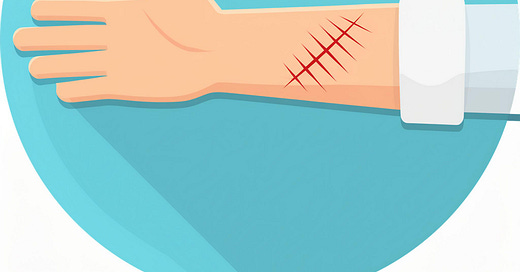Healing Scars
TLDR - Scars can interfere with cellular communication, restrict movement, cause dehydration, and promote inflammation. Healing these scars can help reduce these roadblocks and support the body's return to homeostasis.
Expanded
Scars serve as a protective mechanism to close wounds and prevent infections, but they also can disrupt the body's superhighway of information and energy flow. This superhighway consists of connective tissues, nerves, and blood vessels that facilitate communication and transport essential nutrients and signals throughout the body. When a scar forms, it can create dense, fibrous tissue that interrupts this flow, leading to potential issues:
Impaired Electrical Conductivity: Scars can block the electrical signals that travel through the body's connective tissues, disrupting cellular communication and overall function.
Restricted Movement: Dense scar tissue can limit the range of motion in the affected area, leading to stiffness and discomfort.
Decreased Hydration: Scar tissue is often less hydrated than healthy tissue, which can further impair its function and the flow of nutrients.
Inflammation and Pain: Scar tissue can become a source of chronic inflammation and pain.
Ways to Help Heal Scars
Supplements and Enzymes:
Proteolytic Enzymes: Enzymes like serrapeptase and nattokinase can help break down scar tissue and reduce inflammation. These enzymes work by digesting the proteins that make up scar tissue, promoting its gradual breakdown and removal.
Collagen Supplements: Collagen is essential for skin and tissue repair. Taking collagen supplements can support the body's natural healing processes and improve the appearance and function of scars.
Topical Treatments:
Silicone Gel Sheets: These can help flatten and soften scars, making them less noticeable over time.
Scar Creams: Creams containing ingredients like vitamin E, aloe vera, and onion extract can promote healing and improve the appearance of scars.
Red Light Therapy: This therapy can stimulate collagen production and improve blood flow to the affected area, promoting faster and more effective healing.
Massage and Myofascial Release: Gentle massage and myofascial release techniques can help break down scar tissue, improve circulation, and restore range of motion.
Hydration and Nutrition: Staying well hydrated and consuming a balanced diet rich in vitamins and minerals can support the body's natural healing processes.



